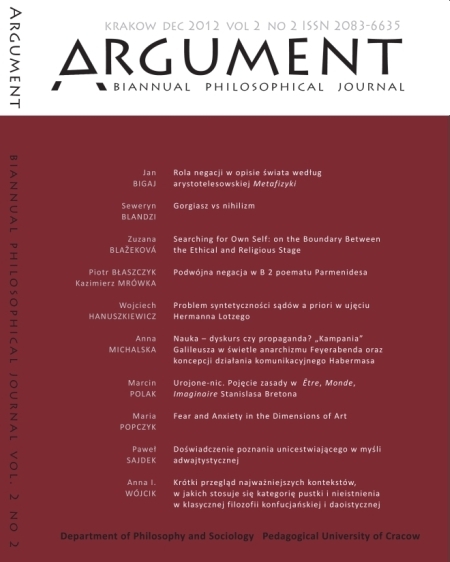Rola negacji w opisie świata według arystotelesowskiej Metafizyki
Keywords:
Aristotle, Parmenides, being, non-being, predicate, object, change, possibility, truth, falsity, assertionAbstract
The role of negation in the description of the world according to Aristote’s Metaphysics: The notions of ‘being’ and ‘non-being’ have entered philosophical language, forming the basis of ontology and meontology, as the counterparts of the Greek expressions to on and to me on (nominalised forms, affirmative and negative, of the participle of the verb einai). Originally, however, these expressions did not have any objectifying meaning, but played the role of meta-language names, representing the copula einai in all its forms, most generally in its affirmative and negative forms. The copula itself, which in later philosophy took on the existential meaning, had functioned only as a semantically empty connective of predicates. Over time the participle on has been used as a universal name of all predicates. The above-mentioned expressions became central in Greek philosophical terminology thanks to the debates, initiated by Parmenides, on the role of negation in the description of the world. Parmenides himself proposed a complete excision of negative sentences as describing by elimination, and created a positive-monistic system which abandoned multiplicity, divisibility, and variability. Later philosophers defended negation, fighting back against the paradoxes formulated by the Eleatics and later by the Sophists. Plato observed that without negation it is impossible to describe the multiplicity of things. He also distinguished a relative negation which does not eliminate anything but makes it possible to confront some things with others. According to the atomists, the divisibility of physical things forces us to accept that they consist of a positive element in the form of an impenetrable body, and of another element lacking any characteristics, i.e. the void. Finally, Aristotle, when analysing the process of change, justified the consistency of the statement that something comes out of “not being” and “being”, under the assumption that the former is understood as being actual, and the latter as being potential. In all these conceptions there is nothing non-existent, there are only proposals of how to identify the aspects of reality whose explanation justifies the use of negation. The affirmative and negative forms of the above expressions have also provoked reflection on the problem of truth and falsity. It has been observed that they are used in everyday language not only to state an agreement or disagreement with the actual facts of the matter, but also to affirm or deny something.


